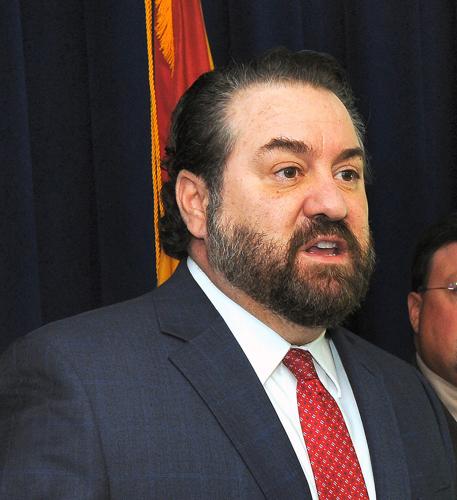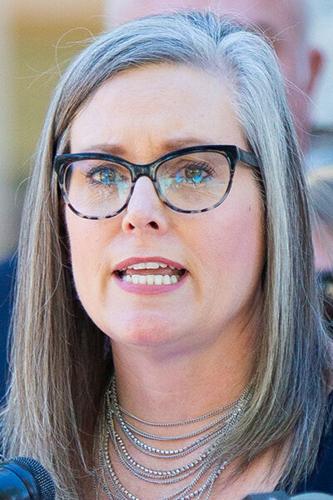PHOENIX — The attorney general’s bid to dictate content of the state’s Election Procedures Manual is nothing short of “an attempted coup d’état,’’ according to a lawyer for Secretary of State Katie Hobbs.
In new court filings, lawyer Roopali Desai said Hobbs, a Democrat, complied with state law by drafting a new version of the manual and submitting it to Republican Attorney General Mark Brnovich for his approval. But rather than have a discussion of the differences, Brnovich simply demanded Hobbs give in to the changes he wants, Desai said.
And when that did not happen he filed suit, in tandem with the Yavapai County Republican Committee.
“Nothing in the statute gives the AG the final say on which specific provisions should or shouldn’t go in the final EPM,’’ Desai told Yavapai County Superior Court Judge John Napper.
Brnovich, who had a Dec. 31 deadline to approve the changes, waited until April 21 to sue, even as county officials are busy preparing for this year’s election.
“After refusing to engage in the drafting process five months ago, the AG cannot now come to court and demand a new EPM with his preferred election procedures,’’ Desai said, calling his lawsuit “far too late, highly prejudicial and procedurally improper.’’
She said Arizona law empowers the secretary of state to draft the manual every other year, submitting it to the attorney general and the governor for their approval. Brnovich wants unilateral power to decide what’s in the manual, she said.
“Plaintiffs’ lawsuit should be seen for what it is — an attempted coup d’état,’’ Hobbs’ attorney wrote. “Plaintiffs cannot illegally seize power that must be shared among three officers of the state’s executive department.’’
The manual is designed to tell local elected officials what they are legally required to do when conducting elections as well as what they cannot do. While some provisions mirror state law, others go into much greater detail.
For example, the 544-page manual approved in 2019 deals with issues including posting the names of candidates at polling places who have withdrawn from a race, factors to consider when selecting polling places, voter education campaigns and how long certain records have to be retained.
At an earlier hearing, Napper questioned whether Brnovich had any legal basis for demanding that certain provisions be added.
One of those sought by the attorney general would spell out exactly what procedures election officials have to follow when verifying the signatures on early ballot envelopes match those already on file. But, the judge pointed out, Arizona law has no such requirements other than to say every signature needs to be verified by a human being.
“You’re asking the secretary to create out of whole cloth ways that individuals are supposed to verify signatures,’’ Napper told the Attorney General’s Office. “The secretary isn’t allowed to sort of create their own rules about how things are done.”
The judge said what Hobbs included in the manual “almost tracks the statue exactly.’’
But he agreed to give Brnovich and his GOP allies another shot to make his case that the manual should be changed.
Desai, in the new filing, told Napper he should toss the case entirely.
Aside from Brnovich demanding that things be his way or no way, she warned of consequences if changes are ordered for this year’s election.
Consider, she said, his demand that the envelopes used to send out early ballots contain the specific words “return to sender’’ if the person to whom it is addressed doesn’t live there.
Desai said county election officials consulted with specialists at the U.S. Post Office who warned that putting that language on the exterior of the envelope could cause sorting machines to automatically return the envelope to the county. As a result, some people would never get the ballots they were expecting. So the secretary of state instead adopted language saying if the person doesn’t live there, “mark the box and return it to the U.S. Postal Service.’’
Several counties already have ordered envelopes with that language, and some already have received them, Desai said.
“It would cost Maricopa County upward of $420,000 to reprint ballot envelopes,’’ she said, even if it were possible to do that in time to send out the early ballots for the primary on July 18.
Potentially more troubling, she said, is Brnovich’s demand that election observers have the right to challenge early ballots after the envelope is opened — when someone’s vote already is known.
“All counties perform signature verification before the envelope is opened to preserve voters’ constitutional right to a secret ballot,’’ Desai told the judge, noting they compare the signatures on the envelopes with those already on file.
Specific disputes aside, Desai said judges should have no role in the dispute.
“That is a discretionary determination involving complex decision-making and priority setting that courts are ill-equipped to inquire into and second-guess,’’ she said. “The court shouldn’t substitute its subjective judgment for that of election administrators who made policy decisions about what EPM procedures are feasible and appropriate.’’
Napper has scheduled a hearing on the issue for June 10.







